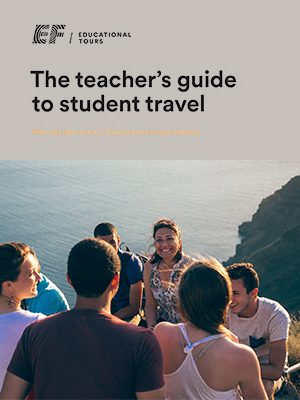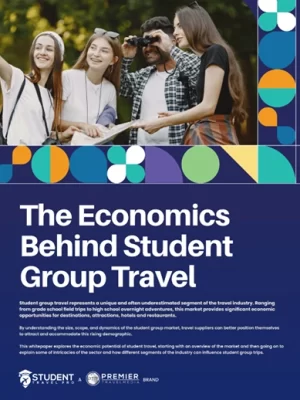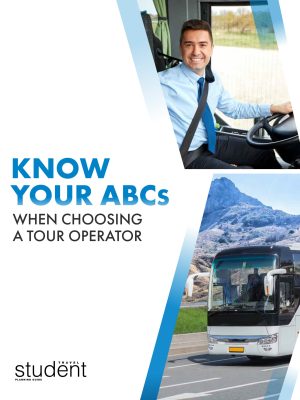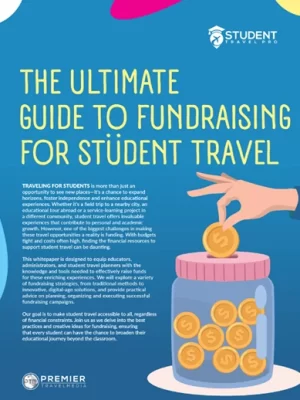We help you craft a fun and engaging educational student itinerary packed with exciting learning in real-time settings outside the classroom
In the realm of education, there’s a universal truth: students learn best when they’re actively engaged in hands-on activities. While the classroom provides a foundation for learning, nothing quite compares to the immersive experiences gained through travel. Teacher-led student travel offers a unique opportunity to bring learning to life, fostering curiosity, cultural understanding, and personal growth.
If you’ve not led a student tour before, the process can seem daunting. There is no rule book or template to follow, so it requires a bit of hard work in laying the groundwork. Let’s explore some proven strategies and provide a few resources to help you make meaningful and memorable experiential learning outside the classroom a reality.
Setting Educational Travel Goals & Objectives
Before embarking on a student travel adventure, it’s essential to define clear educational objectives. Consider what concepts, skills, and experiences you want your students to gain from the trip. Whether it’s studying historical landmarks, immersing in a foreign language, or exploring scientific phenomena, aligning travel activities with curriculum standards ensures that learning remains a priority.
Start by collaborating with fellow educators to identify learning goals and objectives that complement classroom instruction. Tailor travel experiences to meet the diverse needs and interests of your students, incorporating specific activities that spark curiosity and help your class develop their critical thinking skills. By setting educational objectives upfront, you can maximize the impact of the trip and ensure that every moment contributes to academic enrichment.
Choosing the Right Student Travel Destination
Selecting the right destination is crucial in creating an enriching student travel experience. Consider destinations that offer a wealth of educational opportunities, from historic sites and cultural landmarks to natural wonders and scientific institutions. Truthfully, you shouldn’t have to look too far for destinations that align with your curriculum and provide ample opportunities for hands-on learning and exploration.
Research potential destinations thoroughly, taking into account factors such as accessibility, safety, and cultural relevance. Ask fellow educators for reviews of their past travels to gain insights into the educational value of different destinations. Engage students in the decision-making process by soliciting their input and preferences, fostering a sense of ownership and excitement about the upcoming trip.
Planning Engaging Activities on Tour
Once you’ve chosen a destination, it’s time to plan engaging activities that will immerse students in experiential learning. Consider a mix of guided tours, interactive workshops, and immersive experiences that cater to diverse learning styles and interests. Look for opportunities to collaborate with local experts, community organizations, and cultural institutions to enhance the educational value of the trip.
Design activities that encourage active participation and inquiry-based learning, allowing students to explore and discover at their own pace. Incorporate opportunities for reflection and discussion, enabling students to make connections between their travel experiences and classroom learning. By planning a diverse range of activities, you can cater to the varied interests and abilities of your students, ensuring that every learner has the opportunity to thrive.
Embracing Cultural Immersion

Image by Joseph Samson from Pixabay
One of the most valuable aspects of student travel is the opportunity to immerse in different cultures and perspectives. Encourage students to step outside their comfort zones and engage with local communities, customs, and traditions. Emphasize the importance of cultural sensitivity and respect, fostering empathy and understanding across cultural boundaries.
Incorporate cultural immersion activities such as homestays, cultural exchanges, and service-learning projects that allow students to interact with local residents and contribute positively to the communities they visit. Encourage students to try new foods, learn basic phrases in the local language, and participate in cultural celebrations and traditions. By embracing cultural immersion, students can gain a deeper appreciation for diversity and develop essential global citizenship skills.
Facilitating Reflection and Integration
Upon returning from their travel experience, provide opportunities for students to reflect on their learning and integrate their experiences into their academic and personal growth. Facilitate discussions, journaling, or multimedia presentations where students can share their reflections, insights, and reflections with their peers and educators.
Encourage students to identify connections between their travel experiences and classroom learning, drawing parallels, and insights that deepen their understanding of academic concepts and real-world issues. Empower students to apply what they’ve learned to their lives, whether it’s through advocacy, community engagement, or personal development initiatives. By fostering reflection and integration, you can ensure that the impact of student travel extends far beyond the trip itself, shaping students into informed, empathetic, and engaged global citizens.
Teacher-led student travel holds immense potential to transform learning experiences and inspire students to become lifelong learners and global citizens. By setting clear educational objectives, choosing the right destination, planning engaging activities, embracing cultural immersion, and fostering reflection and integration, educators can create meaningful and memorable experiential learning opportunities outside the classroom. With careful planning, collaboration, and enthusiasm, educators can unlock the educational adventures that will enrich the lives of their students for years to come.









